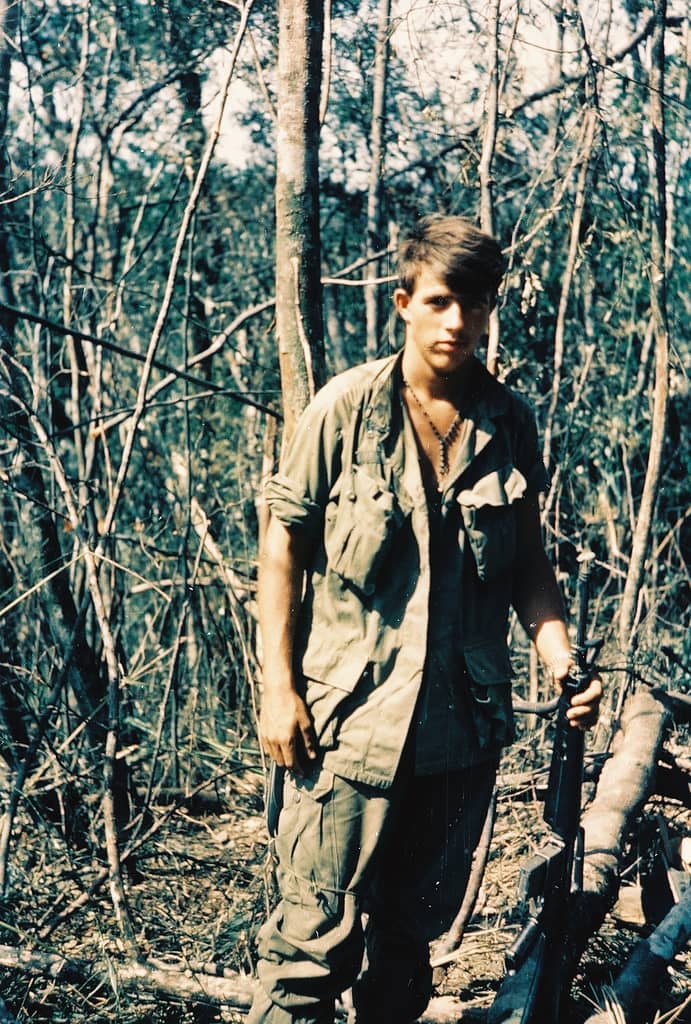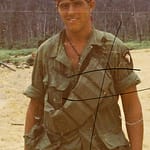One Veteran’s Story – Dale Tauer
The following is the account of the experiences of one Vietnam veteran, Dale Tauer and a Martin County Veteran who saved his life. “He remembers the flash from the RPG as the enemy was only 30 feet away. If it weren’t for Randy Benck, Tauer would not be alive today.” The full account of his experiences are as follows.
Martin County’s Veterans’ Memorial Site will soon have a Bell Cobra Rotary Wing Attack Helicopter on display. This helicopter was a stalwart of the U. S. Army’s attack aviation serving in both Vietnam and Laos from 1968-1971, often saving the lives of many American soldiers. There are many Martin County veterans that have experienced helicopter service as well. The following is the account of the experiences of one veteran, Dale Tauer, and the Martin County soldier that saved his life, Randy Benck.
“The Vietnam War was a long, costly and divisive conflict that pitted the communist government of North Vietnam against South Vietnam and its principal ally, the United States. The conflict was intensified by the ongoing Cold War between the United States and the Soviet Union. More than 3 million people (including over 58,000 Americans) were killed in the Vietnam War, and more than half of the dead were Vietnamese civilians. Opposition to the war in the United States bitterly divided Americans, even after President Richard Nixon ordered the withdrawal of U.S. forces in 1973. Communist forces ended the war by seizing control of South Vietnam in 1975, and the country was unified as the Socialist Republic of Vietnam the following year.”[1]
Dale Tauer grew up and graduated from high school in Morgan, Minnesota, and is currently a resident of Punta Gorda Isles, Florida. Tauer has first-hand knowledge of the Vietnam War, including the significant role a helicopter played during his service.
Tauer was just out of high school in 1969 when he went to Minneapolis to sign up for the draft. He had no desire to go to Vietnam and actually considered going to Canada. However, he was drafted into the Army and was sent to Fort Bragg, North Carolina, for basic training. He then went on to jump school with the 101st Airborne becoming a member of the Vietnam version of the famous “Band of Brothers” from World War II. Following that was three weeks in Fort Lewis, Washington, serving as a clerk typist until an extra soldier was needed to fill a seat on a plane headed to Vietnam. He just happened to become that extra soldier.
When getting on the plane headed for Vietnam, he thought they were going to Korea, however, he was quickly corrected. After refueling in Alaska, the plane hit some ice on the runway during takeoff and crashed through a barricade. As a result, he spent the Christmas weekend in the terminal before being shipped out to Hawaii, without orders.
While in Hawaii, and still with no orders, he was given the job of fixing boat motors at the officers’ club. He also spent time surfing, water skiing, bartending, and in general being somewhat of a “cabana boy.” That came to an abrupt end when one of the officers noted that he had some radio training. The officer told Tauer that he was taking him along to Da Nang because he needed a radioman.
Tauer ended up in Quang Tri as a radioman, admittedly not knowing what was really happening. He was sent with another young soldier to a fire base. The other soldier, a ham radio operator, really liked Tauer’s radio, so Tauer gave him the radio in trade for the other soldier’s job. However, the other soldier didn’t even know his own job.
Tauer’s first day of experiencing battle was very frightening. Their point man was killed and a soldier named “Red” took his place. Tauer then became Red’s slack man (understudy). Next, a sniper killed “Red,” so Tauer became the point man for his squad.
Tauer was involved in “The Battle of Ripcord” that took place in July of 1970. This was the only battle that the 101st Airborne ever lost as well as being one of the last big battles of the Vietnam War. The series of events that followed for Tauer were momentous and life threatening.
The battle involved about 1,500 U. S. Troops up against about 15,000 NVA regulars. During the encounter, Tauer was hit with an RPG (rocket propelled grenade) as he jumped out of a hole to pull another soldier, John Knott, into cover of an enemy’s fox hole complex that they had been dropped into earlier in the day. He remembers the flash from the RPG as the enemy was only 30 feet away. The blast sent Tauer and Knott into the air over the tops of trees.
The next day as the squad was pulling back, Randy Benck, a Martin County soldier, ran down the hill to look for Tauer’s body as he was thought to be dead. He was fortunately found alive by Benck the day following the RPG blast. Benck carried him back to the hill where the few surviving soldiers were gathered waiting for extraction while still under heavy enemy fire.
The first chopper in was hit by a rocket and crashed on top of the guys killing Captain Workman. He had just received the call, “every man for himself.” A second chopper came in after calls from the downed pilot and a remaining crew member in distress. Tauer was in no condition to walk, was in shock, and was weak from loss of blood. Consequently, Benck, who had also been wounded, carried Tauer on to the last chopper.
As if that wasn’t enough, while being medevaced out of battle, the helicopter Tauer was on was struck with machine gun fire by the NVA. The door gunner was hit and bullets pierced the floor of the chopper going between Tauer’s arm and body while, fortunately, entirely missing him. Then, when he finally arrived at the field clinic at Camp Evans, a nurse saw that since he was not “bleeding out,” he was sent to the end of the line of the wounded soldiers. He eventually received treatment for his injuries, was moved to a hospital ship, and then relocated to a recovery center at Da Nang.
As a result of Benck’s daring rescue, Tauer considers him not only his buddy but also his hero. If it weren’t for Randy Benck, Tauer would not be alive today. Sadly, Benck died March 7, 2009, after battling cancer from Agent Orange.
Dale Tauer was honorably discharged from the Army in September of 1971 and returned home to his father’s farm in Minnesota before later getting into farming.
In reflecting on his experience in Vietnam and the war, Tauer felt it to be a terrible waste of lives and that it’s important for people to understand that war is horrible. Because of the bravery and sacrifices of Dale Tauer and Randy Benck, as well as that of others that have served, we as Americans have the privilege of living in a free country. This is something that we can never take for granted!
I would like to acknowledge and thank Dale Tauer for providing this memorable and vivid account of his military experiences and https://donmooreswartales.com/2011/02/23/dale-tauer/ that also served as a source of information for this article.
The Bell Rotary Wing Attack Helicopter will be dedicated on August 1, 2020, at the Martin County Veterans’ Memorial Site on Winnebago Avenue in Fairmont. Watch the local media for exact time of the event and other activities planned for that day.
[1] https://www.history.com/topics/vietnam-war/vietnam-war-history



